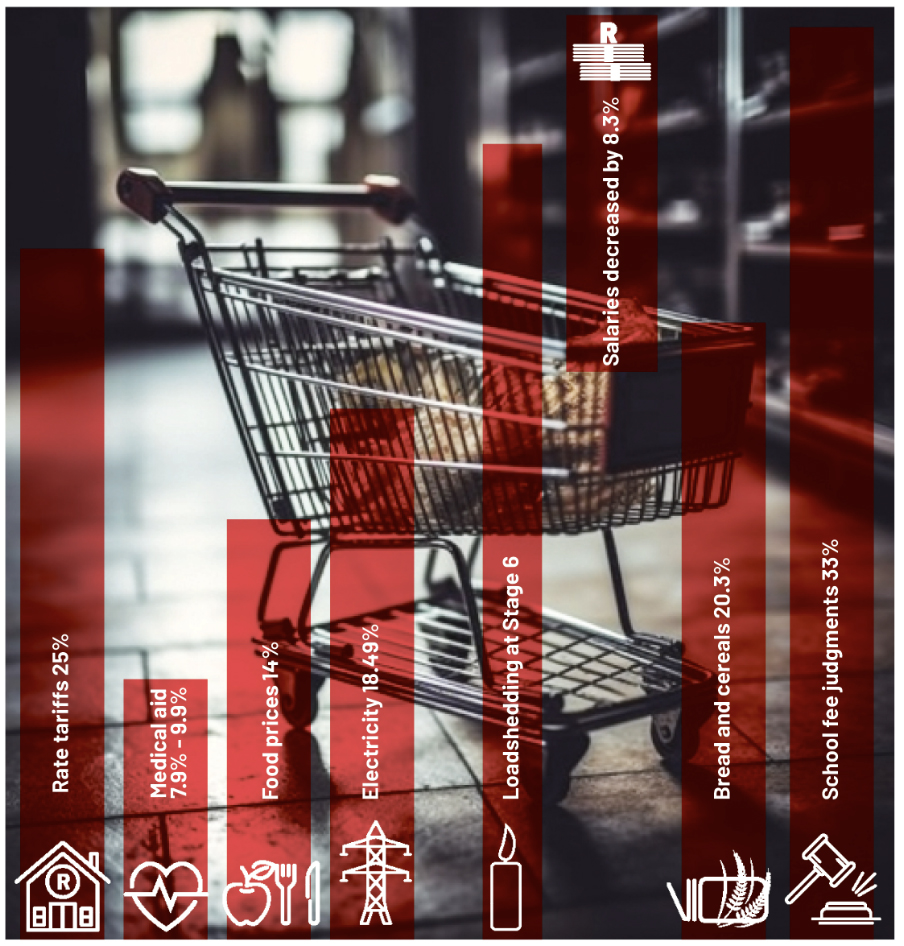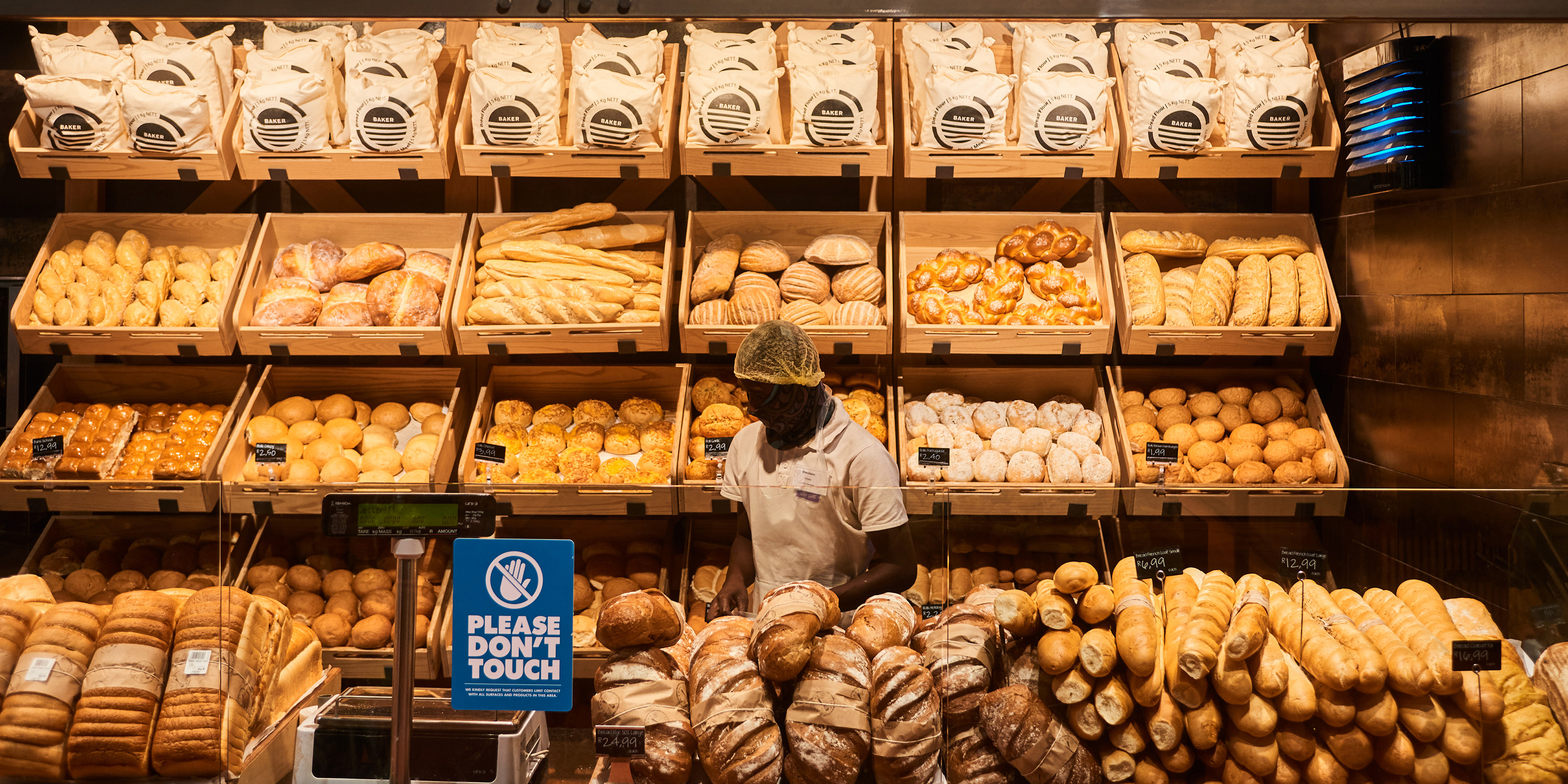COST-OF-LIVING CRISIS
Money’s too tight to mention: SA consumers could be at a tipping point on multiple financial fronts

Food prices, electricity costs, municipal tariffs, medical aid fees – all are soaring as incomes fall, crushing South Africans’ personal finances, while load shedding adds to the pressure on businesses.
The story of consumers being squeezed on all sides is one we have heard endlessly for the past two years, but South Africans could well be at a tipping point.
Municipal rate tariffs are set to be finalised with increases effective from the end of June, the country’s largest medical scheme (Discovery Health) put through contribution increases of 7.9% to 9.9% this month and food prices have risen 14% over the past year – and that’s all before load shedding costs are taken into account.
The Johannesburg municipality’s draft medium-term budget notes that, although there is consensus that not much has changed from the previous financial year, there is a need to emphasise the material impact that load shedding has had on the economy of the region, the increasing cost of living and increased vulnerability of households.
“Load shedding means reduced productive hours, migration off the grid, increasing cost of doing business, shedding jobs in non-key sectors, increased crime and reduced ordinary scale of operations,” the document says. “This impacts municipalities directly [when it comes to] the sales of utility services, additional security measures, the pressure to deal with infrastructure collapse and vandalism, relevance of existing technology and the pace to find alternative solutions.”
eThekwini Mayor Mxolisi Kaunda says the economic climate made above-inflation tariff increases inevitable. “The Eskom increase and the Umgeni Water increase are out of our hands,” he says.
Cape Town’s mayoral committee member for finance, councillor Siseko Mbandezi, says the City has been able to reduce Eskom’s 18.49% municipal rate increase to 17.6% by absorbing about R15-million a month.
“This is while still funding a reliable electricity service and we plan to end [Cape Town’s] sole reliance on Eskom’s expensive power as soon as possible. If the City were to absorb the entire tariff increase, it would amount to more than R180-million per year, which the City and ratepayers simply cannot afford,” he says.
According to Mbandezi, about 70% of Cape Town’s tariff income will go towards buying bulk electricity from Eskom, with the remaining 30% invested in service delivery and ending load shedding.
Cape Town is also planning to give a residents a break for properties valued at less than R5-million, with the first R450,000 of the property value exempt from rates.
Consumers defaulting on municipal rates, and school, doctor and attorney fees
Worryingly, a recent Stats SA report on civil cases for debt shows that consumers are increasingly not paying debt, including municipal rates, levies, school fees and money owed to medical practices and attorneys. These types of debt fall outside the National Credit Act, which means that they cannot be renegotiated by debt counsellors.
Benay Sager, head of the National Debt Counselling Association, says summonses issued for debt related to services, mainly municipal rates, increased about 25% in November 2022, compared with the same month in 2019, before the pandemic.
Comparative data for school fees and tuition, for the same periods, show a 33% increase in judgments. However, the volume of overall summonses has decreased.
“It’s likely that some creditors are realising that getting a summons isn’t the most effective way of recovering what’s owed, and financially stretched consumers are prioritising creditors who shout the loudest.
“Typically, these are businesses rather than schools and municipalities, which is why a lot more people are behind on repaying this kind of debt,” Sager explains.

Consumers are increasingly not paying debt, including municipal rates, levies, school fees and money owed to medical practices and attorneys. (Image: Vecteezy and MidJourney)
Rising food inflation
Reports show that food inflation has rocketed 14% over the past year, taking it to the highest since March 2009. Food and non-alcoholic beverages were the largest contributor to year-on-year inflation, and transport and fuel increases were also sizeable.
Luigi Marinus, head of investments at PPS, says the concern is that the effect of the 4.25-point increase in interest rates since the start of the current hiking cycle is protracted but is not yet having the desired dampening effect on inflation.
“After the surprise 50-basis-points hike post the last [Monetary Policy Committee] meeting, this increase in inflation may signal that we have not yet reached the end of the hiking cycle,” he cautions.
Marinus says electricity and other fuels increased by 8.2% year on year but the approved hike in Eskom tariffs of more than 18%, which came into effect this month, and municipal tariff increases in July will have a further impact on inflation.
Read more in Daily Maverick: Cost-of-living crisis – SA CPI accelerates to 7.1% in March, food inflation at 14-year high
Consumers can’t afford to keep the lights on any more
South Africans are having to contend with sustained Stage 6 load shedding that, by all accounts, will continue indefinitely – with the prospect of moving to Stage 8 as winter approaches.
A recent survey by Debt Rescue showed that 77% of respondents believed electricity had become unaffordable – and a staggering 89% said it will have a significant impact on their budgets.
Neil Roets, chief executive of Debt Rescue, says 40% of those polled were already spending between R500 and R1,500 a month on electricity, and said they could not afford another increase.
The government continues to advise consumers to use electricity sparingly, with reminders that the grid is under pressure, and millions have been forced to take responsibility for their electricity needs at great personal cost.
Roets reports that 61% of respondents had invested in energy-efficient appliances; 29% had switched to prepaid electricity in an effort to reduce their consumption; and 16% had done solar conversions.
“It is hard to believe that the powers that be are unaware of the dire straits that most of the population find themselves in,” he says.
Read more in Daily Maverick: Report shows clear signs of financial distress among SA consumers
Paul Makube, senior agricultural economist at First National Bank, notes that in the food basket, the bread and cereals category posted the highest increase of 20.3% year on year.
“This reflects the delayed pass-through of the recent moderation in grain prices at producer level. Manufacturers are still carrying the high cost of grain prices from 2022 due to the lag of up to five months in the pass-through to the consumer level.
“Persistent and steep load shedding in 2023 has further exacerbated the situation. This category’s weight is significant in the food basket at 21%,” he warns.
Read more in Daily Maverick: Competition Commission slams food producers and retailers over prices
He says unrelenting cost pressures emanating from load shedding will maintain food prices in the short term.
“However, monthly prices on both the domestic and international markets continue to trend on the downside recently, which has the potential to limit further upside in consumer prices in the second half of 2023.
“Fortunately, the domestic summer crop season is expected to end on a high note with a good harvest, given the excellent seasonal conditions, which bodes well for food inflation in the months ahead,” he says.

A worker arranges loaves of bread in the bakery section inside a Checkers supermarket at the Rosebank Mall in Johannesburg. (Photo: Waldo Swiegers / Bloomberg via Getty Images)
Salaries are down and so is spending
The increased pressure on consumer wallets is also reflected in a challenging retail environment.
Lara Hodes, economist at Investec Bank, says that, in several cases, retailers are being forced to mitigate load shedding by spending money on back-up power just to be able to keep trading.
“Consumer sentiment is very subdued, with interest rate [increases] weighing heavily on disposable incomes,” she says.
According to BankservAfrica, average real take-home salaries fell 8.3% in February this year.
This has filtered through to lower consumption expenditure by households and a notable drop in confidence levels as reported in the recent FNB/BER Consumer Confidence Index, which plunged to -23 points in the first quarter of this year, indicating the concern among consumers about South Africa’s economic prospects and their household finances.
One of the country’s largest banks, Capitec, has revealed an 80% climb in credit impairments (clients losing creditworthiness because they cannot pay their debt) to R6.3-billion for the year to the end of February.
Chief executive Gerrie Fourie says the increase in credit impairments is due mainly to the deteriorating economy and the impact of higher inflation.
“We are seeing consumers taking pressure with expenses going up and incomes coming down. I think what I want to say is – don’t keep up with the Joneses, live within your means,” he says.
Read more in Daily Maverick: Capitec CEO warns consumers to live within their means as credit impairments climb by 80%
Hodes says she does not expect a meaningful pick-up in household consumption (which accounts for about two-thirds of GDP) in the short term.
“Growth for this year is projected at 0.2%, with downside risks persisting due to the escalation in load shedding,” she says.
The BankservAfrica Economic Transactions Index, a measurement of economic transactions between SA’s banks, also fell in March to its lowest level since December 2021 – another sign warning of a possible recession on the horizon. DM168
Read more in Daily Maverick: All BETIs are off as key Economic Transactions Index takes a tumble
This story first appeared in our weekly Daily Maverick 168 newspaper, which is available countrywide for R25.





















 Become an Insider
Become an Insider
“The Eskom increase and the Umgeni Water increase are out of our hands,”
THR ABOVE IS BOTH A TOTAL COP OUT AND A TOTAL LIE: Government structures like yours created this nightmare through uselessness and corruption; perpetuate and continue to make it worse through uselessness and corruption. I submit it is ENTIRELY in your hands, and ENTIRELY your responsibility to fix – by doing everything you can to obliterate uselessness and corruption, and using whatever skills the country possesses in order to achieve this, including white ones! Change our society to a law abiding meritocracy, and do it NOW!